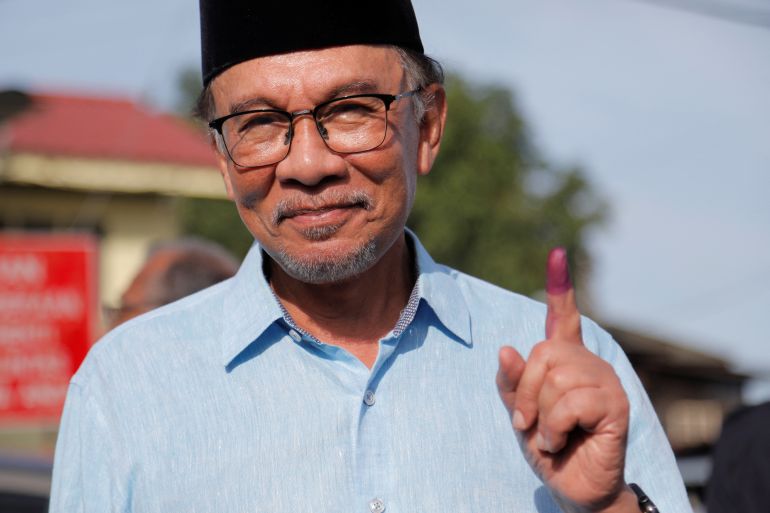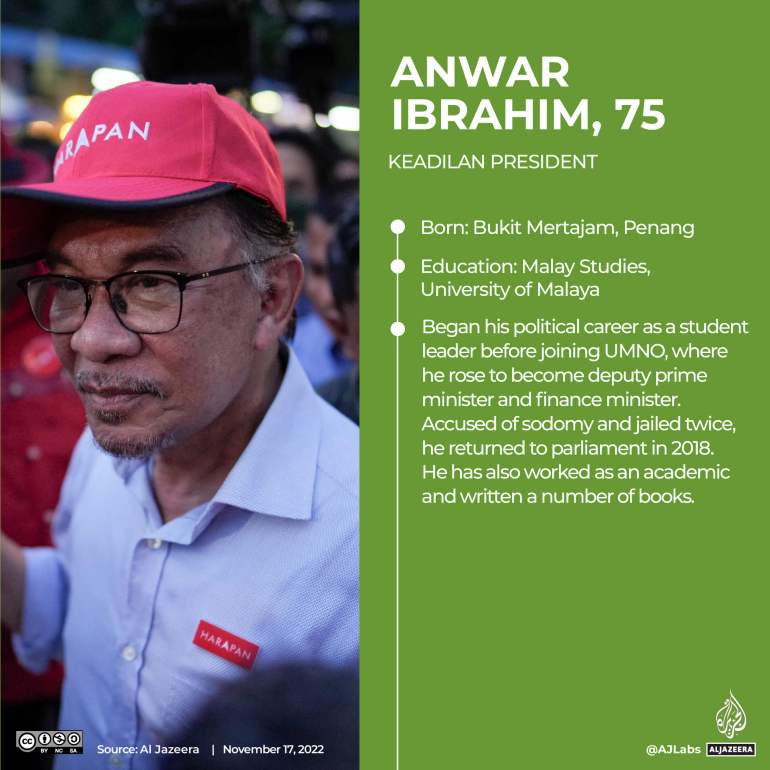Timeline: Anwar Ibrahim’s long road to Malaysian prime minister
Anwar Ibrahim rose to deputy prime minister before he was sacked in 1998 and re-emerged as a figurehead for reform.

Malaysian opposition leader Anwar Ibrahim has been appointed as the country’s new prime minister – the culmination of a decades-long struggle as the face of reform in Malaysia’s politics.
Anwar, a former finance minister and deputy prime minister who spent almost 10 years in jail after falling from power in the late 1990s, was named the country’s 10th prime minister by Malaysia’s king on Thursday.
Keep reading
list of 4 itemsIs it time for Anwar Ibrahim to step aside?
Anwar, Muhyiddin seek support in Malaysia as deadline extended
Anwar sworn in as Malaysia’s PM after 25-year struggle for reform
After a meeting of the royal households, the King Sultan Abdullah Sultan Ahmad Shah announced that Anwar would become prime minister because he had the support of the majority of Malaysia’s 222 members of parliament.

King Sultan Abdullah said the 75-year-old would be sworn in at a ceremony at the palace at 5pm (09:00 GMT) on Thursday.
Anwar has been in politics since emerging as a fiery student activist in the 1970s and his alliance which eventually turned to rivalry with former Prime Minister Mahathir Mohamad has dominated the Malaysian political scene for years.
Here are some key dates on Anwar’s long road to leadership:
August 10, 1947 – Anwar Ibrahim is born in Bukit Mertajam, Penang. Both his parents are UMNO politicians.
1971 – Anwar founds the Muslim Youth Movement of Malaysia, known by its Malay acronym ABIM.
1982 – Having been convinced to join UMNO, Anwar is elected to parliament for the first time, representing the constituency of Permatang Pauh in his home state of Penang.
1983 – Anwar becomes minister of youth and sports, and under Mahathir’s tutelage is promoted first to education minister (1986), and then to minister of finance (1991) and deputy prime minister (1993).

1998 – Months of feuding with Mahathir over Malaysia’s handling of the Asian financial crisis culminates in Anwar being sacked and accused of sodomy – a crime in Malaysia – and corruption. Tens of thousands take to the streets in support of Anwar who secures support from large numbers of Malay Muslims, the largest ethnic group in the multicultural country, to drive his “Reformasi” movement.
1999 – Anwar builds on the momentum for reform to found the Parti Keadilan Nasional or National Justice Party (KEADILAN) a forerunner of Parti Keadilan Rakyat (PKR), or the People’s Justice Party. Separately, Anwar is convicted and jailed on charges he maintains were politically motivated.
2003 – Mahathir steps down after 22 years as Malaysia’s prime minister.
2004-13 – Four years after his 2004 release from jail, Anwar is again accused of sodomy by a male aide. Anwar says the accusations are aimed at removing him from his post as leader of the opposition, which came close to defeating Najib Razak – another Mahathir protégé – in the disputed elections in 2013.
2015 – Anwar is jailed for sodomy for a second time.
2016-17 – Mahathir quits UMNO amid calls for Najib to resign over a multibillion-dollar corruption scandal at state fund 1MDB. Mahathir forms a new party, Bersatu, before joining forces with Anwar’s opposition coalition, Pakatan Harapan (PH). Mahathir promises to seek a royal pardon for Anwar and hand him the premiership if the coalition succeeds in its bid to remove Najib and the UMNO-led government.
2018 – Anwar and Mahathir join forces to lead the opposition to an unprecedented victory in the election on May 9, 2018, ending more than 60 years of UMNO rule. Within a week, Anwar is pardoned and released.

2019 – Anwar denies accusations of having sexually assaulted a former male aide, describing the claims as “politics at its worst”. The case is dropped on grounds of insufficient evidence.
2020 – Mahathir faces pressure from Anwar’s allies in the coalition to set a date for the handover of power, sources said. Senior politicians from Pakatan and the losing opposition parties meet at a five-star hotel on February 23 in what becomes known as the “Sheraton move”. Anwar blames “our former friends” in Mahathir’s Bersatu and “a small faction of traitors” from his own party.
February 24 – Mahathir resigns as prime minister.
March 1 – The king appoints Muhyiddin Yassin as prime minister after meeting every member of parliament to canvas levels of support.
The appointment of Muhyiddin, who heads Mahathir’s Bersatu party, will ironically bring back to power the United Malays National Organization, which was overthrown by Mahathir’s governing alliance in the historic 2018 vote.
September 23 – Anwar says he has enough support in parliament to become prime minister and urges Muhyiddin to resign.
October 13 – Anwar meets the king and says he has shared evidence of his support with the monarch. He says he has a “formidable” majority and that Muhyiddin should step down.
August 16, 2021 – Muhyiddin Yassin resigns after just 17 months in power amid infighting within his coalition, and a resurgent wave of COVID-19.
August 21, 2021 – Malaysia’s Ismail Sabri Yaakob is sworn in as the country’s ninth prime minister. Ismail Sabri is a veteran politician from the country’s longest-ruling party United Malays National Organisation (UMNO), but analysts say he is a stop-gap leader with little chance of ending the long-running turbulence.
October 10, 2022 – Prime Minister Ismail Sabri Yaakob calls an early election after months of political in-fighting among politicians in his ruling coalition. He says holding an election meant “the mandate was returned to the people” and that a democratic vote would help to establish a “strong, stable and respected” government.
November 19, 2022 – Malaysia’s general election ends in a hung parliament, with the coalition led by Anwar winning 82 seats, followed by the Perikatan Nasional (PN) coalition under former Prime Minister Muhyiddin Yassin, which gets 73 seats.

Anwar and Muhyiddin try to reach a majority to form a government and King Sultan Abdullah Sultan Ahmad Shah holds meetings with both. The role of Malaysia’s constitutional monarch is largely advisory, but under the constitution, the king does have the power to appoint a prime minister that he believes has the confidence of legislators.
November 24, 2022 – Anwar takes oath after he is named Malaysia’s 10th prime minister by the king.